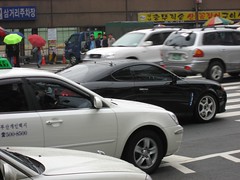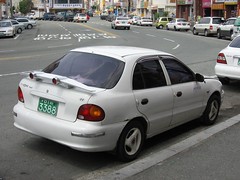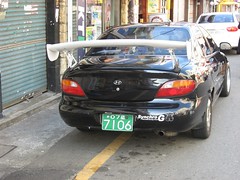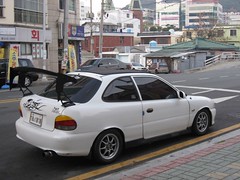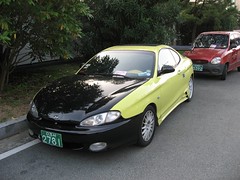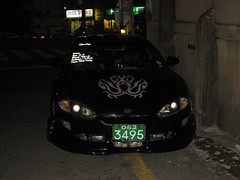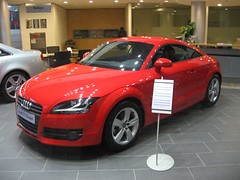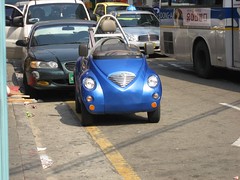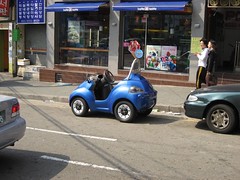Before we left Korea, we booked return tickets because they were the same price from the travel agent as singles because of a special offer. It wasn't certain that we'd use them - we thought that if we did we could perhaps come back for a holiday. But once back in England things went wrong almost from the outset.
"I told you I was sick"
I'd been diagnosed with a medical problem in Korea which required treatment, but when I returned home the same tests came back negative. So I got no treatment, but I became more ill - which may or may not have been related. Either way, I had further tests which also came back negative. Still, there was no doubt that I was sick, and that rather flew in the face of what the British tests were telling me.
Finally, a rude doctor, who obviously thought it likely that the pain I was in was all in my mind, prescribed physiotherapy, which due to the slow speed of the process I've yet to be scheduled for. My wife has been furious about the entire experience, and whereas once I would have struggled to understand that anger, now that I've lived in Korea with its instant diagnosis and treatment, I'm incredibly frustrated too, because I have to live with the idea that in the hopefully unlikely event that my problems turn out to be something sinister, by the time the British medical system admits it the damage will have been done.In my weaker moments I've honestly thought about jumping on a plane and returning to Korea to get some treatment and get better, because it would be easier and very much cheaper than trying to pursue private treatment in England, which tends to require sign-off from the NHS doctors in the first place.
When I left Korea, some people said I should continue to write about my experiences back home because they were interested, but England holds no fascination for me so I really wasn't. In truth I did start writing about them, but quickly realised it would quite possibly have been a contender for the world's most negative blog, and who wants to read that? Certainly I didn't want to write it. But please indulge me in relating a few incidents, because I have a feeling these will become important later and highly relevant to my Korean life.
The Housebreaker, The Drug-User, and The Computer Science Graduate
We're very big on the notion of 'class' in Britain, although some people like to pretend there's no such thing and in fact we live in a 'classless' society. Certainly, it isn't like the past, where your social status for life would be defined by the class you were born into, but there's no doubt in my mind that class still exists, and what's more, it's something which is pretty much universal; there's a class system of sorts in Korea, in America and everywhere else, because children do not grow up being treated equally, and the opportunities you are afforded depend on where you were born, and to who to. I was born into a working class family in a decaying industrial northern English city with a high proportion of non-English speakers. I think the word 'poor' is both emotive and subjective, so I wouldn't like to say we were, but we didn't have a lot of money, my mother didn't work because of a medical condition and my father worked in a low-paid manual job which constantly seemed to be under threat. Looking back, I see that I got an education in spite of my schools, rather than because of them, and of my closest circle of friends one became a serial housebreaker, and another a drug addict. It was that kind of environment.
Dirty Looks From Testosterone Girl
So when I say that one of my first experiences back in England was to get annoyed with a working class common-as-dirt girl in a doctors' waiting room, I don't want it to come across as the inevitable middle-class arrogance of someone who has been born into better circumstances. I think life is what you make of it, and if I am arrogant now, and I don't deny that I am, it's because I think we live in a society which increasingly celebrates stupidity and self-centredness and allows people to get away with not bettering themselves. But I don't blame society so much as the people within it, and I find it hard to tolerate the obviously stupid and self-centred. I worked hard to better myself in difficult circumstances. A lot of other people didn't. It's hard for me to be sympathetic towards them.
The girl got agitated because I was in the doctors office for ten minutes, and started asking loudly in the testosterone-fuelled voice many young women seem to have these days, why "it was taking so f*cking long". The tirade of impatience went on. In the absence of an answer the girl finally resorted to scowling at my wife, who, faced with someone who evidently had enough testosterone to fuel a rugby team, felt suitably intimidated. I believe it would be unthinkable for a 17-year-old girl to behave the same way in front of so many adults in Korea, and would probably invite a psychiatric evaluation, but here it's not so surprising, and nobody gets locked up for it.
O2, Brute?
I was on a busy bus travelling out of the city centre, but despite the mass of people around us a young woman had no reservations in broadcasting the contents of her
mobile phone conversation to everyone within shouting distance. I appreciate the English language is changing, but personally I'm not sure I'm ready to start answering my phone with the line
"Hello you dick 'ed". It transpired that the presumed boyfriend of our local broadcaster, hereafter referred to by the more affectionate name of 'bastard', had gone '
gallivanting' off with three girls, one of whom was a well-known
'slut'.
And so it went on. Loudly. Quite why the 'girl', if such a name doesn't breech the
Trades Descriptions Act, felt the rest of us needed to hear about her personal life is beyond me, but she seemed to be one of these pre-Copernicus types of people who believes that the Universe revolves around her. Or maybe she thought she was
the star of her own reality TV show. So obviously, we had to hear. Suffice to say it wasn't long before I was cheering on the
'bastard' boyfriend and sincerely hoping that he never returned from his 'gallivanting', while accepting the inevitability that even with this temporary evolutionary escape, it probably still wouldn't be long before our mouthy girl procreated elsewhere ensuring the continued shallowing of the gene-pool.
I generally don't understand the conversations that go on around me in Korea, and perhaps that's a good thing.
But God Saved Us
I was on a bus with my wife, travelling out of the city centre early on a Saturday afternoon. It wasn't very busy and so the young South Asian woman talking on her mobile phone near me was more than audible. I probably wouldn't have listened but suddenly she caught my attention with what I thought was an unusual sentence:
"God saved us."
From her tone of voice, it was not merely a comment, but an assertion - an attempt to convince. But if that got my attention, the next line saw me become intently focused:
"I know it was supposed to explode, but God saved us."
This was evidently a more impassioned part of the unfolding conversation, and unfortunately after this I couldn't make out what else was said, though that could also have been because it wasn't in English any more.
The woman had two bags with her which looked like they came from a shopping trip, and somewhat to my relief she left the bus at the next stop with both of them. I don't know what I would have done if she had accidentally left one. My wife later confirmed word for word what young woman had said. What was supposed to have exploded, and why did God save them? I will never know.
There is of course, almost certain a completely rational explanation for this which doesn't involve terrorism. After all, it's a fairly stupid terrorist who talks about God and things exploding in the same sentence on a mobile phone with the Government listening - and I don't think Al-Qaeda have decided to start blowing up buses in the Northern English provinces on a wet Saturday afternoon, particularly in a city with one of the highest pro-rata Muslim populations in England. Whether there can be a perfectly innocent explanation for that conversation is a more open question. Either way, it served as a reminder of the dangerous times we are in and the possibility that the unexpected can happen anywhere, at any time.
Bangers and Thieves
I was walking in front of a busy row of shops in the city centre when there was a small bang on the floor by the side of me. Three girls, probably in their late teens, had thrown a small banger of some kind to the floor where it had exploded. Apparently this was hilarious. Although it made me jump a little, I didn't take it particularly personally because there were so many other people around that my wife and I were walking in single file in order to negotiate our way through the crowds. However, afterwards she told me that the banger had exploded just by her foot and she had taken it more personally because the girls were looking at her as they laughed.
A little later, inside a shopping mall, there were three similar bangs nearby as I waited at a store, and although I couldn't see the cause it seemed fairly clear that this was due to other people throwing small fireworks. Predictably, as the sound echoed within the building an overweight security guard calmly walked in the opposite direction as though he was oblivious to anything which might require him to do his job.
Perhaps this is a new trend. It seems incredible that these actions don't cause someone nearby to violently retaliate, and perhaps it will happen on occasion, but until the individual perpetrators are challenged they will feel free to continue their actions unchecked. Will that person ever be me? Probably not, but you can never tell with me. More worryingly, neither can I. As each year goes by the boundaries of anti-social behaviour seem to be rolled back even further and we seem powerless to stop it.
The night before I discovered that throwing small explosives at people's feet was the latest thing for youths to do, I was up late playing a computer game to work off some of the frustrations of a bad week. Just before I went to bed, somewhere between 2am and 2.15, I heard people talking outside on the street. They weren't particularly quiet, but since the kind of people who come back from a night out in the early hours of Saturday morning don't tend to be, I thought little of it. After all, there didn't seem to be any antagonism and aside from some raised voices and a couple of car doors slamming there was nothing to indicate that the house two doors above us had just been robbed. So I went to bed oblivious and gradually picked up the details as the next day unfolded and police worked their way around the street knocking on doors and collecting evidence. The thieves had evidently damaged a number of cars trying to break into them after they'd hit the house, but surprisingly my car was untouched. The number of robberies in our street is increasing.
Fourteen Days in May
The incidents related above represented my first two weeks back home, after which I stopped making notes on my experiences because it was simply too depressing. I also think I began not to notice, which is possibly even more disturbing. A number of people, similarly jaded with life in England, asked me why I'd returned, and I began to wonder myself. Sometimes it takes living outside of a country to come back to it and see it for what it is, and I finally realised what a mad place my country was. Korea, of course, is also quite mad, but in a different way, and it has the advantage of not being my country and therefore at some level, not being my problem.
I was angry when I came back to my country. Angry at how I'd had to fight to return with my wife. Yes, we won the case, but was I supposed to just forgive and forget? They never apologised. I suppose you wouldn't expect them to. But why not? The judge said they'd operated outside the law and our lives were put on hold, and put through considerable stress and financial expense, for six months. My father died and I didn't get to see him again. But they aren't sorry. And they don't care. Knowing how hard my Government had worked to keep me out of my country, I didn't settle back into life in England, and I suppose I was more than willing to see its faults, perhaps that was unfair, but that was the hand I was dealt.
Show Me The Money!
Along the way, the Credit Crisis confirmed that the UK was in serious trouble, trouble it would pay the price of for many years to come. Social problems will grow, taxes will increase, so I see no better world here in the long run. And I also paid a price. Some stock market traders have done well in the Crisis, and some have been wiped out. People I knew are gone. I've survived, but what was a job has turned into a war, fought around the clock against the global markets. In percentage terms I've outperformed most hedge-funds and pretty much every investment bank in the world, but I've concluded it's no way to live, and for a less stressful life would have happily returned to my previous life of IT contracting if the job situation wasn't deteriorating rapidly, which it is.
So beyond the health issues, and England's broken society, the financial situation leaves me with a choice. Or maybe it really doesn't. We have to follow the money. "Show me the money!"
On the balance of probabilities, our financial future looks more certain in Korea than it does in England, so it looks like we have to return, and this time our stay will be open-ended. That makes it a different prospect, and in some ways a rather terrifying one. In all honesty, it is not the life I would have chosen, but it is the life I have, so I have to make the best of it and look forward to the opportunities I hope it will afford me. It promises to be uncertain and chaotic, with no guarantee of success. So no change for me there then.
